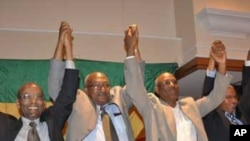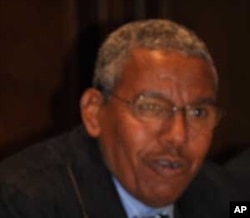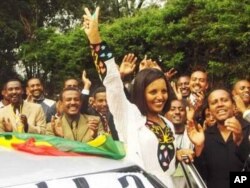Siye Abraha is not a new name in Ethiopian politics. But the former rebel commander and former minister of defense is new to opposition forces.
Siye, a former top ranking official with the ruling party, was released from jail two years ago after finishing a six-year sentence on corruption charges that he claims were politically motivated. Today, he is running for parliament in his home district Kola Temben, in the northern region of Tigray. This week, Siye is on the campain trail.
“The EPRDF did not anticipate the formation of a party that raises the rights of not only Tigreans, but also issues many Ethiopians agree with,” Siye said.
“Our message of change resonates with all, including Tigray.”
The region is the home ground for a key partner of the EPRDF coalition, the Tigray People’s Liberation Front (TPLF). In the 1970s and 80s, Tigray served as a base for the successful armed struggle against the Marxist military junta of Mengistu Hailemariam.
Siye Abraha and his compatriot Gebru Asrat were leaders in TPLF’s guerilla war and became high ranking officials in 1991 when Mengistu’s tenure ended. Siye was a minister of defense and Gebru served as the president of Tigray. However, their dissident political views were not tolerated by Prime Minister Meles Zenawi. After Ethiopia’s two-year war with Eritrea ended in 2000, Siye was sentenced to jail on corruption charges, and Gebru and others were purged from their influential posts.
Today, Siye Abraha and Gebru Asrat are members of an eight-party coalition called Medrek. They are both running for parliament for the first time as part of the opposition.
A dfficult road ahead
Amare Aregawi is the publisher of the bi-weekly Reporter newspaper. He says it is not easy for the two politicians to change TPLF’s long support in Tigray.
“Even though we have these two candidates who were members of TPLF, we should not forget that they are fighting for two seats out of so many seats in the area. The balance of power will be very difficult to shift,” Amare said.
“It is not a question of individuals; it is a question of ideas. They are new faces, but do we have new ideas?”
Campaigining for the Oromo vote
Medrek is composed of eight ethnic and national parties. For the May 23 election, it hopes to appeal to voters based on its diverse composition of leadership and its promise of change, including free market reforms.
Most of all, party leaders are banking on the reputations of veteran Oromo politicians Merera Gudina and Bulcha Demeksa. The Oromo are the largest ethnic group in Ethiopia accounting for more than a third of the country’s population.
Amare says Oromo votes are divided.
“Merera Gudina is a lecturer at Addis Ababa University by profession. He has stayed in the opposition for a long time, maybe longer than others. He should have done much better,” Amare said.
“We should not forget that there are other Oromo organizations. There is part of the ruling Oromo People's Democratic Organization, there is Bulcha Demeksa and others.”
Another veteran politician and university professor Beyene Petros also belongs to Medrek. Beyene’s support base is in southern Ethiopia. He has been in parliament for three terms representing the Kembata and Hadiya constituency.
Birtukan's case
On Sunday, Medrek will be participating without one of its leading stars. The president of Medrek’s core component party Unity for Democracy and Justice, Birtukan Mideksa, is in jail serving a life sentence on charges of treason.
The U.S. State Department, in its 2009 report, called Birtukan’s arrest politically motivated and urged for her immediate release before the May 23 elections. New York-based Human Rights Watch criticized the Ethiopian government for keeping Birtukan, a single-mother, behind bars.
Her supporters both at home and abroad have petitioned, rallied and lobbied for her release.
Each month, in front of the State Department and the White House here in Washington, supporters urge the Obama administration to put pressure on the Ethiopian government to release her.
Congressman Donald Payne spoke about the matter in March at a hearing of the Foreign Relations Sub-Committee at the US House of Representatives on Capitol Hill.
“My concern goes for the deteriorating condition of Ms. Birtukan who testified right here before this committee and continues to languish in prison in Ethiopia along with hundreds of others without access to medical care,” Congressman Payne said.
The Obama administration’s top diplomat to Africa, Johnnie Carson says his administration is urging the Ethiopian government to free Birtukan Mideksa.
“We ourselves have asked the Ethiopian authorities about why she was rearrested after having been paroled and whether, in fact, we can expect her release anytime soon.”
To date, Birtukan Mideksa remains behind bars.
Lidetu's comeback
Other significant political parties in the May parliamentary elections are the All Ethiopia Unity Party, led by veteran politician Hailu Shawel and the Ethiopia Democratic Party led by young politician Lidetu Ayalew.
“If you compare the political campaign of the opposition, the guy who is outsmarting the others is this guy called Lidetu,” says Amare Aregawi.
“He did his homework. In the previous election people saw him as a traitor. Kinjit party’s patriots accused him of betraying the party. Now he is creating an image that in the previous election he was blamed for so many problems of the opposition party. He has managed to change some of the mentality of the people.”
Divided opposition
Overall, the Ethiopian opposition is weaker than it was before the 2005 elections, which were marred by irregularities.
A major contender in the 2005 elections, the Coalition for Unity and Democracy, disintegrated in the aftermath of the polls that were followed by widespread discontent and subsequent arrests and killings.
Human Rights Watch’s Africa Program’s director Georgette Gagnon says the ruling EPRDF stifles opposition to continue its rule.
“If as expected the EPRDF, the ruling party, wins a landslide victory, it is unlikely to be a victory for democracy. Rather, it will be a vindication of the strategy of repression and control.”
Publisher Amere Aregawi adds to that by blaming the opposition for their never ending internal disputes and subsequent divisions.
“They are not united. Two weeks back we saw the opposition fighting with each other over control of one office,” Amare said. “There is also a disappointment concerning the opposition, people feel there is no strong opposition.”
The May 23 elections will be Ethiopia's fourth national polls since rebels overthrew the country's long-time ruler, Mengistu Hailemariam nearly two decades ago. A coalition of rebel groups formed the EPRDF and have been in power ever since.
Scattered and heavily stifled opposition parties made a concerted effort to win the 2005 national elections, but their successes were marred by irregularities. In addition, many opposition leaders were thrown into jail after refusing to join parliament. The State Department says that by 2008, over 150 opposition members joined the legislature. However, rules changes within the body made it difficult for them to influence policy.











